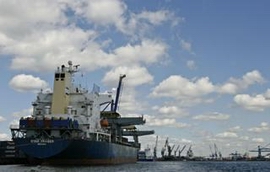 Brazil's clogged ports are already a bottleneck, slowing exports of the recent bumper crop of soybeans and grains. Unions held a six-hour strike on Feb. 22 that halted the movement of goods through the country's biggest port, Santos, and union leaders say they will hold a 24-hour strike on Monday if their main demands aren't met.
Brazil's clogged ports are already a bottleneck, slowing exports of the recent bumper crop of soybeans and grains. Unions held a six-hour strike on Feb. 22 that halted the movement of goods through the country's biggest port, Santos, and union leaders say they will hold a 24-hour strike on Monday if their main demands aren't met.The unions object to new rules that would let privately owned port owners and operators hire nonunion workers and let those ports operate under rules that would lower costs for exporters compared with the public ports.
"If they don't give up some ground on the worker rules, then there won't be an agreement," said Paulo Pereira da Silva, president of the Forca Sindical federation of unions.
The government is ready to make some concessions to the unions, in order to protect workers' rights, according to a government official close to the talks.
"We can reach an agreement today," said the official, who declined to be named. "The government doesn't want to hurt workers either; it's not because of pressure to avoid a strike."
Delays at Brazil's ports are already putting some grain-export contracts at risk. Sunrise Group, China's leading importer of soybeans, said Wednesday it will cancel an order to purchase about two million metric tons of Brazilian soybeans because of the delays.
The port delays are being caused by the unusually large volume of grains from record-size harvests, which is leading to backups of trucks waiting at the ports to unload their cargoes. Heavy rains in recent days, which slow or stop grain loading, are also contributing to the delays, especially at the port of Santos, near Sao Paulo.
Santos is the busiest container port in Latin America, and it is the point of exit for much of Brazil's exports, including coffee, soybeans, orange juice, cars and industrial equipment.





